

Pet flea treatments poisoning rivers across England, scientists find. Highly toxic insecticides used on cats and dogs to kill fleas are poisoning rivers across England, a study has revealed.
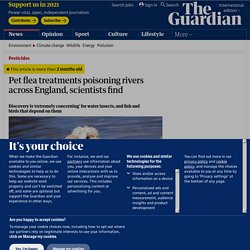
The discovery is “extremely concerning” for water insects, and the fish and birds that depend on them, the scientists said, who expect significant environmental damage is being done. Thai Caves Attract Millions of Bats — and Now Scientists Too. PHOTHARAM, Thailand — The bat caves reeked of bat.
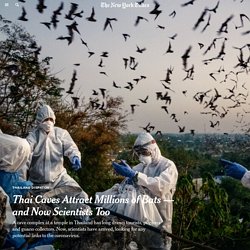
In the murk of the grottoes, in a cave complex west of Bangkok, Thais in headlamps and with flashlights went about their business. Deadly diseases from wildlife thrive when nature is destroyed, study finds. The human destruction of natural ecosystems increases the numbers of rats, bats and other animals that harbour diseases that can lead to pandemics such as Covid-19, a comprehensive analysis has found.
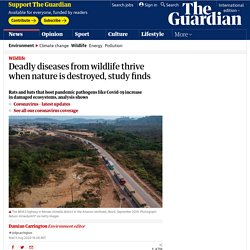
The research assessed nearly 7,000 animal communities on six continents and found that the conversion of wild places into farmland or settlements often wipes out larger species. It found that the damage benefits smaller, more adaptable creatures that also carry the most pathogens that can pass to humans. The assessment found that the populations of animals hosting what are known as zoonotic diseases were up to 2.5 times bigger in degraded places, and that the proportion of species that carry these pathogens increased by up to 70% compared with in undamaged ecosystems.
Humans populations are being increasingly hit by diseases that originate in wild animals, such as HIV, Zika, Sars and Nipah virus. Ecology and economics for pandemic prevention. For a century, two new viruses per year have spilled from their natural hosts into humans (1).
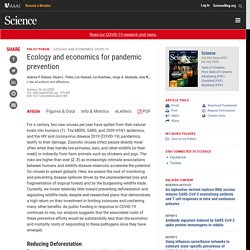
The MERS, SARS, and 2009 H1N1 epidemics, and the HIV and coronavirus disease 2019 (COVID-19) pandemics, testify to their damage. Zoonotic viruses infect people directly most often when they handle live primates, bats, and other wildlife (or their meat) or indirectly from farm animals such as chickens and pigs. The risks are higher than ever (2, 3) as increasingly intimate associations between humans and wildlife disease reservoirs accelerate the potential for viruses to spread globally. Here, we assess the cost of monitoring and preventing disease spillover driven by the unprecedented loss and fragmentation of tropical forests and by the burgeoning wildlife trade.
Twitter. Coronavirus is a warning to us to mend our broken relationship with nature. In 1997, a large area of rainforest in south-east Asia was burned to the ground to make way for palm oil plantations.
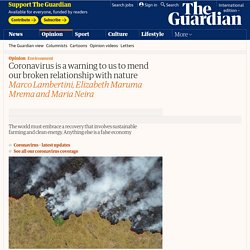
A combination of deforestation, forest fires and drought are believed to have forced hundreds of fruit bats away from their natural habitats towards fruit orchards planted in close proximity to intensive pig farms. Pandemics result from destruction of nature, say UN and WHO. Pandemics such as coronavirus are the result of humanity’s destruction of nature, according to leaders at the UN, WHO and WWF International, and the world has been ignoring this stark reality for decades.
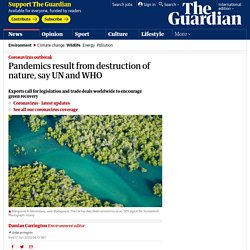
The illegal and unsustainable wildlife trade as well as the devastation of forests and other wild places were still the driving forces behind the increasing number of diseases leaping from wildlife to humans, the leaders told the Guardian. Ignore the conspiracy theories: scientists know Covid-19 wasn't created in a lab. Crab blood to remain big pharma's standard as industry group rejects substitute. Horseshoe crabs’ icy-blue blood will remain the drug industry’s standard for safety tests after a powerful US group ditched a plan to give equal status to a synthetic substitute pushed by Swiss biotech Lonza and animal welfare groups.

The crabs’ copper-rich blood clots in the presence of bacterial endotoxins and has long been used in tests to detect contamination in shots and infusions. More recently, man-made versions called recombinant Factor C (rFC) from Basel-based Lonza and others have emerged. An industry battle has been brewing, as another testing giant, Lonza’s US-based rival Charles River Laboratories, has criticised the synthetic option on safety grounds. Maryland-based US Pharmacopeia (USP), whose influential publications guide the drug industry, had initially proposed adding rFC to the existing chapter governing international endotoxin testing standards. Rspb.2019. One Health: let’s not have pandemics get in the way.
If you want to save the world, veganism isn’t the answer. Veganism has rocketed in the UK over the past couple of years – from an estimated half a million people in 2016 to more than 3.5 million – 5% of our population – today.
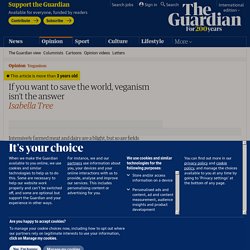
Influential documentaries such as Cowspiracy and What the Health have thrown a spotlight on the intensive meat and dairy industry, exposing the impacts on animal and human health and the wider environment. But calls for us all to switch entirely to plant-based foods ignore one of the most powerful tools we have to mitigate these ills: grazing and browsing animals. Rather than being seduced by exhortations to eat more products made from industrially grown soya, maize and grains, we should be encouraging sustainable forms of meat and dairy production based on traditional rotational systems, permanent pasture and conservation grazing. The animals live in natural herds and wander wherever they please. One Health Outlook. MAN: a thought provoking animation about the human impact on the world and the often negative effect we are having on our beautiful planet. #EarthDay. Colombian court orders government to stop deforestation, protect climate.
By Ucilia Wang An appeals court in Colombia on Thursday reversed a lower court decision and ruled that the country’s government, from the president to local municipalities, must create and implement plans within five months to stop deforestation in the Amazon.
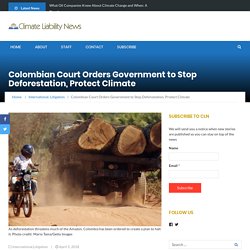
The court, in 4-3 ruling, also said that the Amazon enjoys legal rights and protection under the law, an unusual but not unprecedented concept. Colombia’s Constitutional Court ruled last year that the heavily polluted Atrato River in northwestern Columbia has rights to protection and conservation. With that opinion, the court ordered the government to clean up the river, which was contaminated by mercury mining. Calls to rein in antibiotic use after study shows 65% increase worldwide. A dramatic rise in global antibiotic consumption has led public health experts to call for fresh strategies to rein in excessive use of the drugs, and for major investments to provide clean water, sanitation and vaccines in countries where infectious diseases are rife.
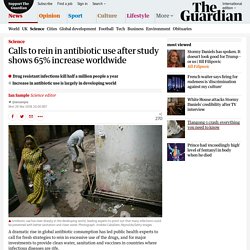
The unrestrained use of antibiotics is the main driver for the rise in drug-resistant infections which now kill more than half a million people a year worldwide, including 50,000 in Europe and the US combined. Left unchecked, the spread of drug resistance could claim millions of lives a year by 2050, according to a 2014 report for David Cameron, the former prime minister. Despite efforts to encourage more prudent use of antibiotics, an international team of researchers found a 65% rise in worldwide consumption of the drugs from 2000 to 2015.
The sharp upturn, revealed in sales figures from 76 countries, was driven almost entirely by rising use in poorer nations, the study found. … we have a small favour to ask. India award for burning elephant photo. Image copyright Biplab Hazra/Sanctuary Wildlife Photography Awards An image of two elephants fleeing a mob that set them on fire has won top entry in a wildlife photography competition. (Warning: The full version of this image is below - some may find it distressing.) Biplab Hazra's picture shows a calf on fire as it and an adult elephant run for their lives in eastern India. Announcing the award, Sanctuary magazine said "this sort of humiliation... is routine". The photo was taken in West Bengal, where human-elephant conflict is rife. Why We Love Silo Working And What To Do About It.
In 1988 Phil. S. Ensor coined the term the functional silo system. His contention was that narrow, specialised teams and jobs were easy to manage but imposed a very damaging learning disability on the organisation. We become focused on addressing organisational fixes rather than exploring the underlying symptoms.Social chasms emerge resulting in people not seeing any problem in context. Indeed – cross organisational problem solving can break down.And as every function focuses on its own objectives and KPIs – the organisation slowly becomes reactive. Nearly 30 years later, silo working is one of our most enduring management buzzwords. They’ve gone nowhere – so are silos really such a problem? Cheetah 'more vulnerable to extinction than previously thought' Urgent action is needed to stop the cheetah – the world’s fastest land animal – becoming extinct, experts have warned.